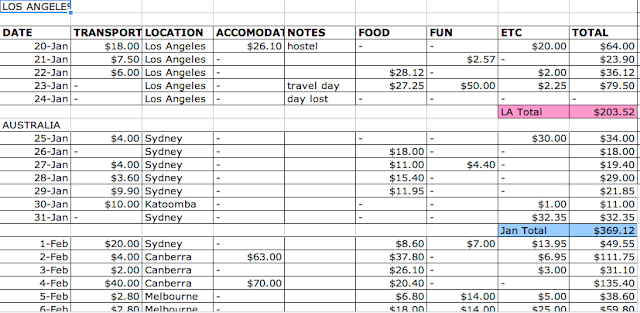Initially this was one very long 2,000+ word post, but now I’ve broken it down into many posts to avoid overwhelming readers. I will continue this series for the next few weeks, breaking down the costs of accommodation, living expenses, food and drinks and the overall cost of traveling in Australia.
I’ve been back from my Australian adventure for over a year and one of the questions I get most often is, “Isn’t it expensive to travel over there?” The answer is: (hell) yes. But mostly when compared to other places.
While the US and Australian dollars are almost equal in value, it takes more Australian dollars to purchase the same items you would buy back in the US. As of today, $1.00 US dollar is equal to $0.95 Australian dollars.
I willingly admit that I wasn’t prepared for the cost of traveling in Australia before I left home. I had already booked my flight but had saved no more than $2,000 to last me until I found a job. That amount only lasted me a few weeks of traveling the Great Ocean Road before I needed to start the job hunt.
And keep in mind that during this entire time I was staying for free at my then-boyfriend’s house. Had I stayed in hostels the entire time by budget would have withered away even quicker.
Upon applying for my working holiday visa, I was required to have evidence of funds for $5,000 AUD in the bank. I didn’t even have half of this amount so I had my fingers crossed that no one would check and thankfully, they didn’t.
But I should have because they set this figure for a reason. It’s enough to keep you going for a few months or to book the next flight home, should you need to. Note that this is in addition to the $365 visa application fee.
ATM fees sucked away my American money very quickly. After I had spent the initial cash I had saved, I withdrew a couple hundred dollars from my American account when I needed it, which charged me $5 for each transaction. It may not sound like a lot but it adds up quickly!
If you are staying on a working holiday visa, I highly recommend getting a free checking account from an Australian bank to avoid fees. I used Commonwealth and was very happy with their service.
I ended up exchanging money at the airport rather than beforehand, which was a mistake. Many banks offer money changing services to their customers but sometimes only on certain days. Call your branch to be certain.
Taxes in Australia are what most people, apart from my Scandinavian friends, would consider to be high. Thirty two cents out of every dollar of your wages are taken out, but on a working holiday visa, you can receive your taxes back nearly in full after you’ve finished working. You can also apply to receive your superannuation, or retirement fund, if you don’t plan on returning to work in Australia.
Before throwing away your planned budget after comparing it to mine, consider a few things. Firstly, I lived for free for a few months and had a few free or discounted hostel stays. I also split costs with someone at the beginning of my travels.
I didn’t spend as much on food while living in Sydney because my job included a staff meal or sometimes two, nearly every day Monday through Friday. And lastly, all things considered, my goal was to do Australia cheaply. There are some amazing luxury experiences to have if you can afford to do so. See my Australia budget here.
Wages are higher, as are benefits. I earned $16 AUD per hour plus tips at a job that pays $4.50 USD plus tips back home. Even though there isn’t a tipping culture in Australia, I earned enough every night to pay for my train fare to and from work.
Australia is on the Medicare system, so doctors and hospitals are obligated to provide you with care, even if you don’t have insurance. I paid $50 for a walk-in doctor’s visit, including prescriptions.
Overall, I spent an average of $1,000 per month while living in Sydney and between $2,000-3,000 per month while traveling. I did my best to travel in Australia cheaply, but I hope you can learn from my mistakes. Read on next week for tips for keeping the cost of accommodation down while traveling in Australia.

The exchange rate has been crippling recently and there is no doubt it is an expensive place to visit.
I recently posted an article about getting around Melbourne cheaply http://flightsandfrustration.com/the-magic-of-melbourne-getting-around-on-the-cheap/
and I dare say staying/working in hostels is the best way for backpackers to try to cover their day to day costs and make their budget last longer.
Agreed! Look out for my next post about cutting down on the cost of accommodation!
Hi Caroline, Thanks for the budget information about Australia. I would love to visit one day but the high costs means that it probably won’t feature in my first RTW trip.
But you never know.
Hi Christine,
I just found out about your blog. It’s really informative and helpful in preparing my trip to Oz and NZ in april/may this year. We live in the Netherlands and the prices are slightly less so that’s kinda convenient in comparison to the US dollar.
We are gonna hire a campervan and use the national parks and free camp sites to keep the costs down for some activities worth the money ;)
Anyway, keep it up! You got a new follower.
I’m travelling Australia for three months from the end of September. This breakdown is really handy!!